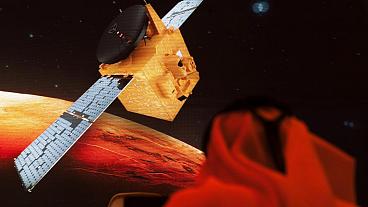Six years of hard work and careful planning by a young team of Emirati scientists and engineers at the Mohammed bin Rashid Space Center in Dubai, the moment they prepare to launch the Hope Probe on a seven-month journey to Mars, the first mission of its kind in the Arab world and historic moments For everyone involved.
“We have really confused feelings, moving between enthusiasm, happiness and gratitude for this opportunity and between tension, anxiety and horror,” says Aisha Al-Sharafi, an engineer at the UAE Mission to Mars.
Also, the head of the Emirates Space Agency, Dr. Ahmed Belhoul Al Falasi, expresses joy that cannot be contained: “We are trying to preserve our feelings, however we cannot contain our happiness. We spent six years preparing, we passed the first stage of the launch, but we are still waiting for the second stage, which is the part. Important".
The successful launch achieved a short-lived respite as the team prepared for the next round of potentially successful or failing moments, starting with the spacecraft's separation from the rocket, as it pushed at 34,000 km / h towards Mars.
According to Aisha Al-Sharafi, the propulsion system engineer for the Al-Amal probe, the first minutes of the operation are crucial and critical: “After five minutes of separation, we will deploy the solar arrays. After about fifteen to thirty minutes of separation, we will get the first signal, and then we will start the engines Reaction control is physical so we can stabilize the spacecraft and capture sunlight. "
Each of the mission's targets succeeded on the night of the launch, says Imran Sharaf, Project Manager of Mission Hope: "We conducted the launch operation and separated the spacecraft from the launch vehicle. It happened about an hour after the start of the operation. Right after that, about 20 minutes later, we were able to receive the signal." First of the spacecraft. "
Although the Emirati mission was led locally, it could not have been achieved without a commitment to international cooperation, and here he adds an honor, explaining: “Instead of building all the facilities from A to Z locally, we used and rented the facilities available around the world. Instead of building our own deep space network. "We use the NASA network, we connected it to our operations room in Dubai. We bought the services of the Japanese company" MHI "to launch the spacecraft. So the mission has a very international character, and the reason for our success is international cooperation."
But the mission met its share of challenges.
According to Mohsen Al-Awadi, a systems engineer in the UAE project to explore Mars, the challenges are there and the team is trying and succeeding to overcome them: “We anticipate and think about the things we might face when it comes to taking risks and when it comes to scheduling and so forth ... Covid 19 was definitely not there. ** In the beginning ... we had to ship the spacecraft early to Japan, about a month before the scheduled date. This in itself was a huge challenge that the team managed to overcome. **
The ultimate goal of the mission is to collect data that will be freely shared with everyone. For these scientists, this is the most exciting part ever, says Minister of Advanced Science Affairs in the Emirates Sarah Al-Amiri: "Science is not owned by one nation. Here is where its beauty lies. It is something that exists for all of us. The fun part starts with science, starts with collecting scientific data, verification." From it and from the validity of the treatment that we have done so that we can export our data sets to the public and scientists around the world in order to work on them and benefit from them in their fields of research. This also incites the scientific team to launch and start research. We really hope that we will reach a scientific discovery by the end of the year two thousand and twenty through The data to be collected in that year. "
Whatever discoveries Mars might be in store for them, this mission has already given the Emirati team tremendous practical knowledge, and the hope that access to the Red Planet is within their reach.

Comments
Post a Comment